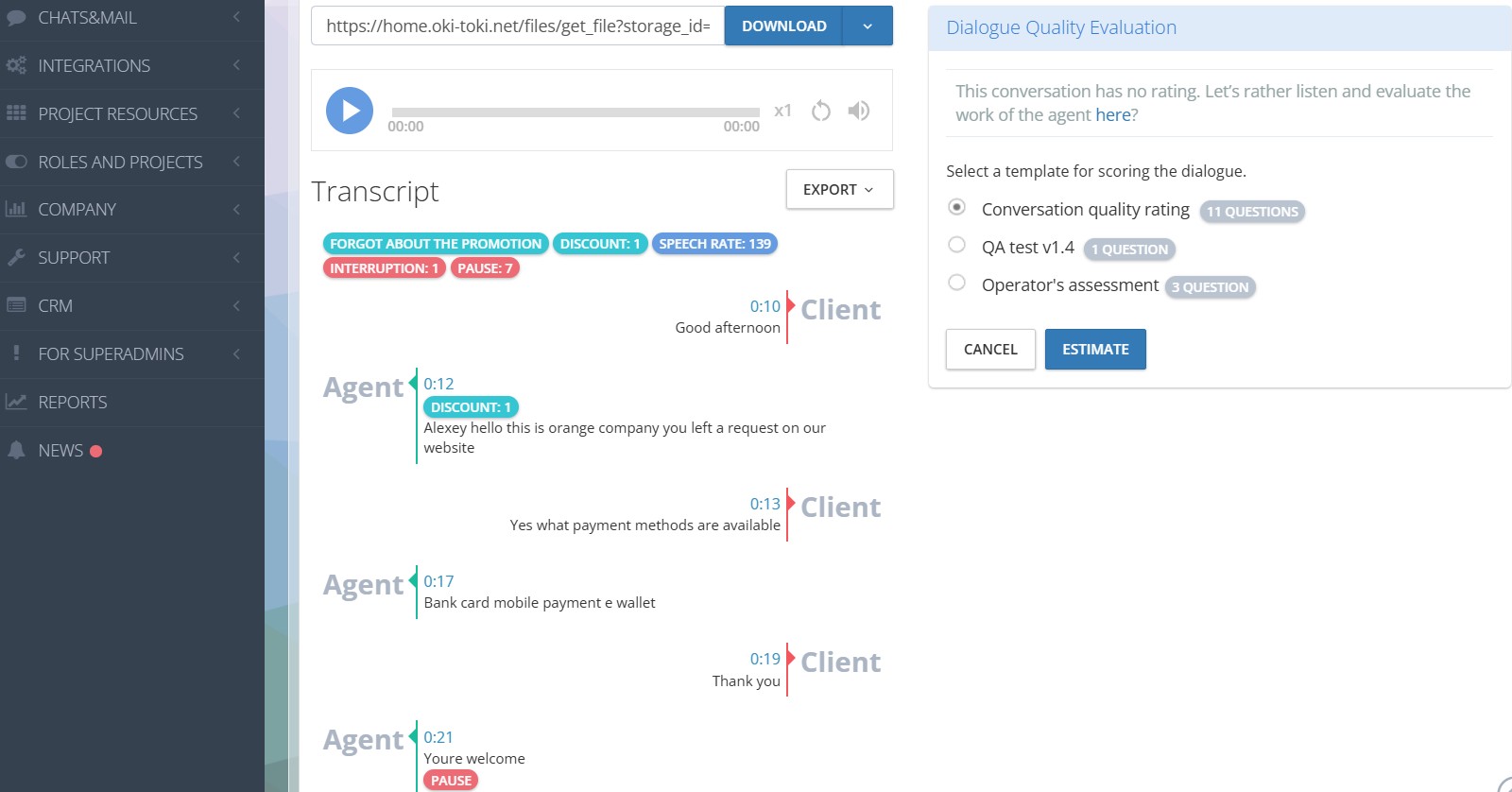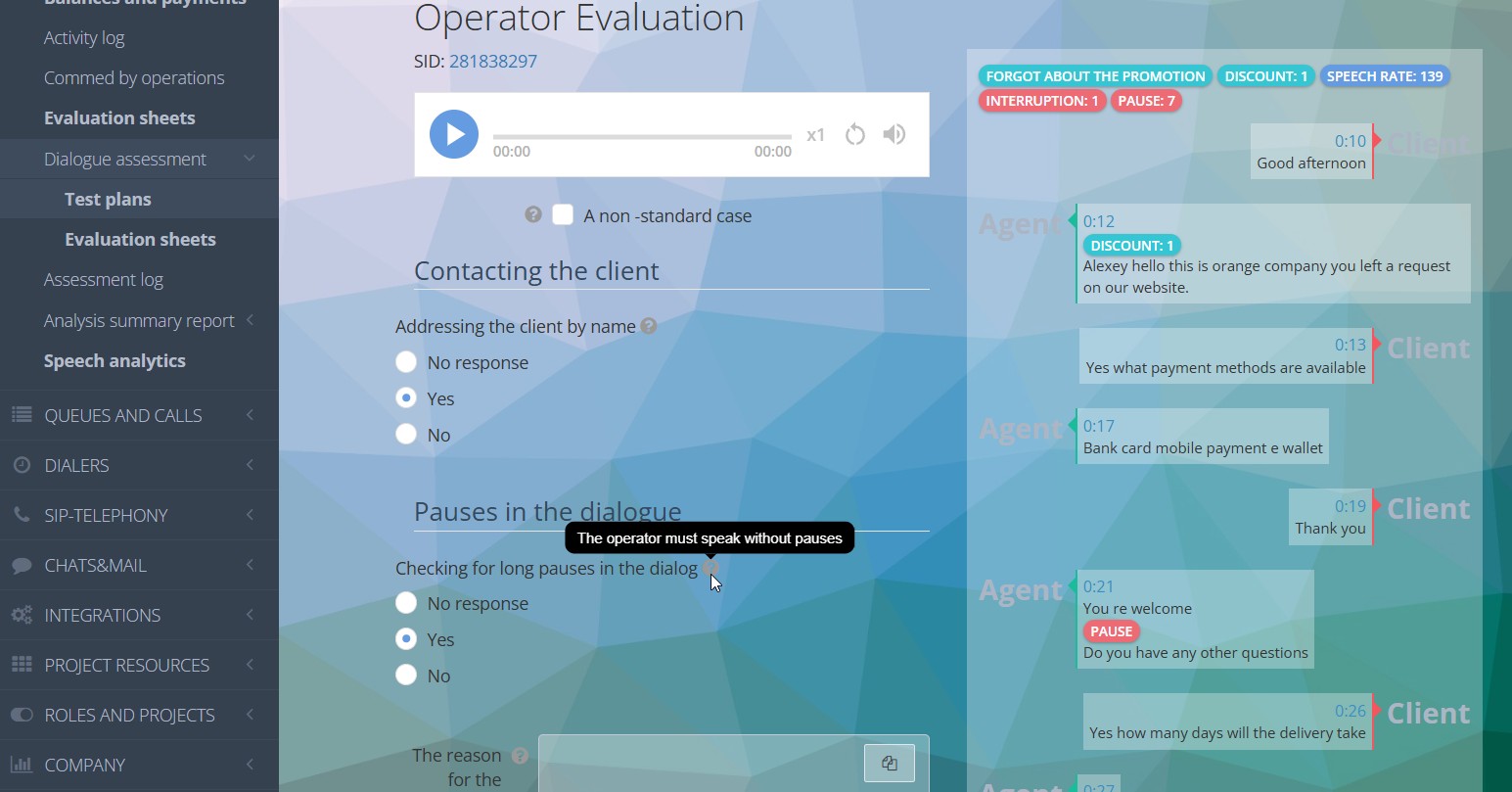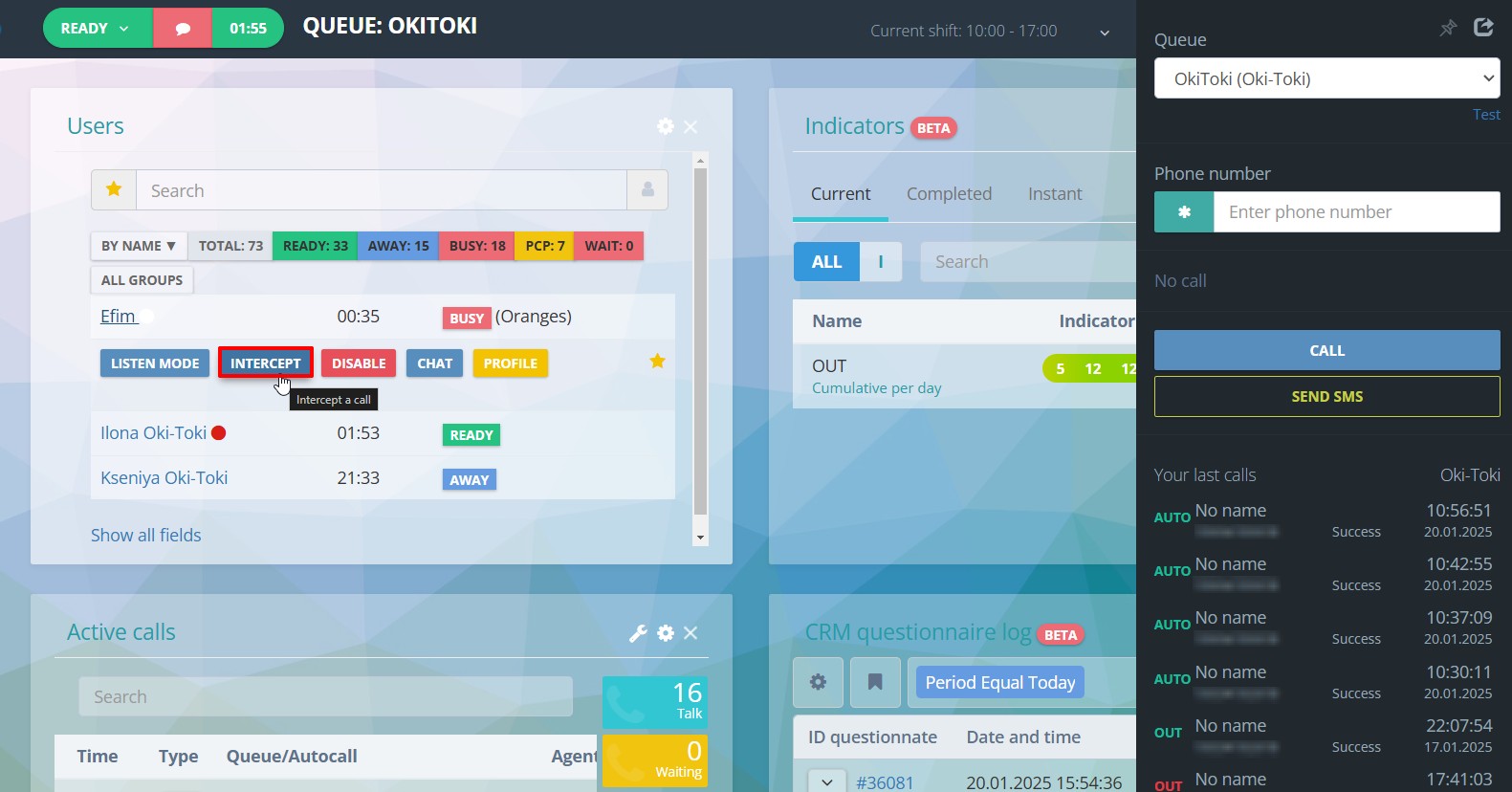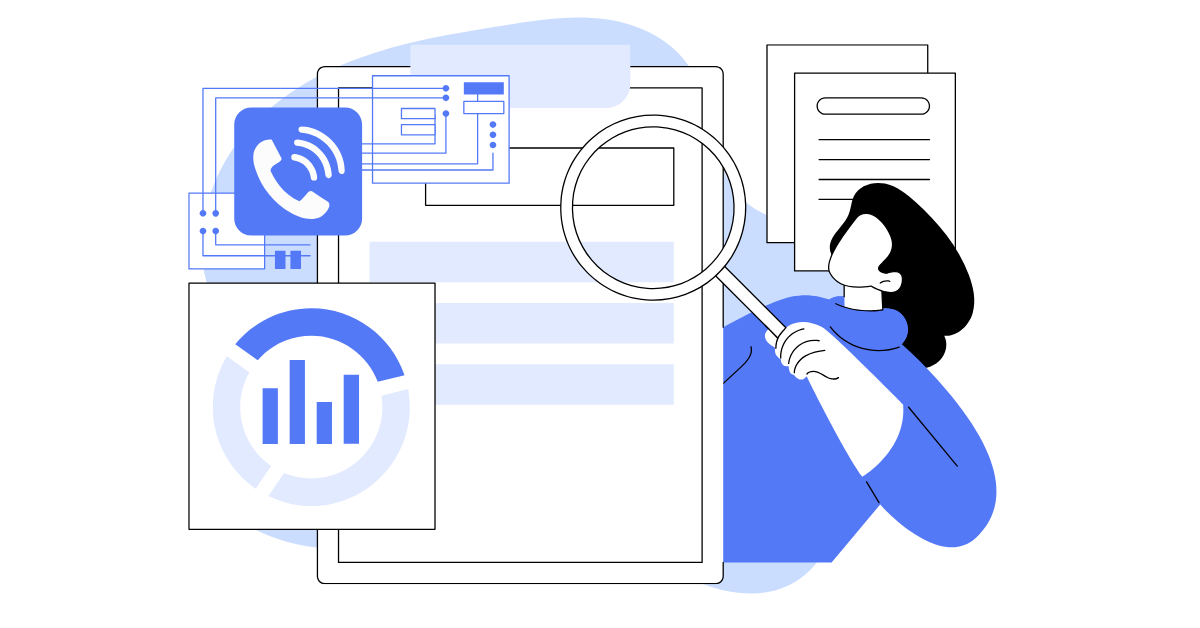A good agent is not just someone who reads a script, but someone who truly hears and understands the client. In our article, we described what active listening is, and selected 4 simple training exercises to help your agents develop the necessary skills.
What is active listening?
Active listening is not just hearing but understanding the interlocutor. For a call center agent, this is important in order to establish contact with the client and learn about their needs. Unlike passive information perception, active listening is not only paying attention to the words but also to intonation, emotions, and hidden signals.
Active and passive listening: what’s the difference?
Passive listening is simply perceiving the client’s words, whereas active requires involvement. For instance, instead of “I understand,” an agent may clarify: “You’re saying that the delivery of your order is delayed? Let me check and help resolve the issue”.
Active listening in sales will help create a trusting atmosphere where the client feels understood, and this increases the likelihood of successfully closing a deal. For example, an agent using active listening techniques might catch the client’s hidden needs and offer additional services or goods.
Techniques and call center listening skills
Different techniques help effectively communicate with the client:
Clarifying questions: will help clarify the situation’s details and avoid misunderstandings.
“Let me ask a few clarifying questions” “Do you mean that the problem only occurs at a certain time of day?”“Just to clarify, have you checked the balance and it’s positive, right?““What concerns you the most about card issuance: the method of delivery or the limit amount?“
Empathy: will create an emotional connection with the client and show that you understand their feelings and are ready to help.
“I can imagine how this may be inconvenient for you, but I have to ask a few questions to understand the situation better, okay?”
“I completely agree with you, let’s figure this out together”
Paraphrasing: to confirm the accuracy of the client’s words.
Pauses: give the client time to express themselves, which is especially important in stressful situations. But after the client has finished speaking, it’s better to ask an open question to avoid silence in the dialogue. Useful tips for agents:
- Don’t get distracted: focus on the client’s words and intonation.
- Ask open-ended questions: “What is important to you when choosing a product?”
- Engage in self-analysis: after the conversation, think about where you could have better understood the client.
How to develop active listening?
Regular practice and performing exercises on active listening in the call center will help agents improve this skill. We’ve selected a few simple exercises that can be easily implemented in the daily routine of a call center and yield notable results.
Exercise 1: Recap
This exercise requires two participants, playing roles: one as the customer, the other as the agent. The one in the role of the customer tells a story that happened, and the agent has to recap it. The story should include several important and significant details that cannot be missed. This develops the skill of active listening and remembering key information.
Recap – is highlighting the main idea and conveying the essence. Other employees can also participate, training themselves in information perception and checking if they’ve missed any important details.
Story example:
“Hello, my name is Alex, and I needed internet at my country house. I called and left a request with manager Anna on Thursday. I provided all the details, and Anna said that the connection would take two days. A technician arrived on Saturday and set everything up. Later, I noticed that the speed was lower than promised in the tariff on the website. Instead of the promised 100 Mbps, it was about 20. I immediately called the company, and they connected me with Anna, who explained that there were temporary issues related to equipment settings, and that the speed should normalize within a day. But it’s been a week, and the internet speed remains just as low.”
Key words for the recap that were important to remember:
- Client’s name Alex;
- Connected internet in a country house;
- Request was made on Thursday;
- Connection on Saturday;
- Request was processed by Anna;
- Internet speed lower than stated in the tariff;
- Tariff promised 100 Mbps;
- In reality, the speed is 20 Mbps;
- A week passed, and the speed remains low.
Add an evaluation element: colleagues rate the recap on accuracy and highlighting key points. This encourages attentive listening and remembering details.
Also use paraphrasing techniques to teach agents how to succinctly and precisely convey the essence of what the client said. Regular practice and analysis will help solidify these skills in practice.
Exercise 2: Questions and Answers
This activity involves a group of agents simply recording answers to several questions that are spoken aloud. This is a relatively simple task for attentiveness.
Questions:
- Question 1: How many months in the year have 28 days?
- Question 2: A farmer has 17 sheep, and all but 7 were stolen. How many sheep does the farmer have left?
- Question 3: How many seconds are in a minute if every third stopwatch stops at 59 seconds?
- Question 4: How many times can you subtract 5 from 25?
- Question 5: Which mountain was the tallest in the world before Everest was discovered?
This exercise on logical thinking and attentiveness. We hear what we expect to hear, therefore we often give incorrect answers and don’t always catch the most important part of the question, getting distracted by irrelevant details.
Answers:
- Answer 1: All 12 months have 28 days.
- Answer 2: 7
- Answer 3: Every minute has 60 seconds, regardless of the stopwatches.
- Answer 4: Once, because after the first subtraction you will be subtracting from 20.
- Answer 5: Everest was always the tallest mountain, even before it was discovered.
Exercise 3: Empathy and Emotions
Play the “How would you feel if…?” game. This develops empathy and emotional intelligence. For instance, analyze a situation with an unhappy client and ask an agent to put themselves in their shoes. Such an exercise teaches better understanding of emotions and reactions.
Conduct training sessions with agents on real-life cases, analyzing clients’ emotions and their reactions to them. Use examples from your own experience or situations that agents encounter. Discuss the emotions agents experience in response to client reactions to teach them how to manage their feelings and remain calm.
How to approach conflict-prone clients and motivate an agent after an angry call read on our blog.
For the analysis and study of complex agent calls, you can use speech analytics oki-toki and QC tools, to find contentious moments and understand the emotional mood of communication with clients.

How to build trust with call center clients can be read in a separate article.
Exercise 4: Active Listening Practice
Sharing examples of conversation recordings when an anonymous agent failed to correctly hear the client will help other employees avoid the same mistakes.
In oki-toki, you can listen to agent talks and save audio call recordings. When evaluating dialogues, there is a voice change feature to avoid bias.

Ask the team to listen to a complex call and reflect on what went wrong. Let agents share their thoughts on how it could have been prevented.
In conclusion, ask each team member to share what they learned, remembered, or will focus on to avoid repeating it in the future.
Don’t forget about feedback and help employees with difficult situations. In the oki-toki agent station, you can listen to a call online and intercept it.

How else to improve agent work and turn a “bad” call center agent into a “good” one read on our blog.
What hinders good active listening?
Here are a few examples of agent behaviors that prevent “hearing” the client:
- Interrupting or rushing to answer before the client has finished speaking. Sometimes it’s important just to let the person express themselves.
- Fearing to make mistakes, knowing that calls are recorded. This causes unnecessary tension.
- Defending if the client criticizes the company. This prevents constructive dialogue.
- Talking more than listening. Active listening implies attention, not dispute.
- Blindly following the script, which doesn’t solve the problem. It’s important to adapt to the situation.
- Thinking your opinion is always correct, and the client is mistaken.
This reduces the consultant’s ability to listen and understand the client. But there are other reasons that interfere with work. For instance, many are afraid to ask the client to repeat what they said. However, it’s better to clarify the question than to miss important information.
Distracting factors
Noise, stress, or emotional discomfort — all this distracts employees. It’s important to consider such moments as:
- Physical discomfort: hunger, cold, fatigue, headache.
- Emotional turmoil: irritation due to the client, system, or processes, taking criticism personally, or just having a bad day.
It’s important to support the team and be prepared for tough conversations, helping agents and noticing signs of dissatisfaction.
The peril of assumptions
When agents face a situation similar to their past experiences, they might think they already know the solution to the problem. However, what worked before may not suit a specific client. Active listening requires attention, flexibility, and the ability to listen to each individual, even if the situation seems familiar.
We hope our tips and exercises on developing active listening skills will teach agents to communicate better with clients and understand them. Try, experiment, and enhance your employees’ skills.



